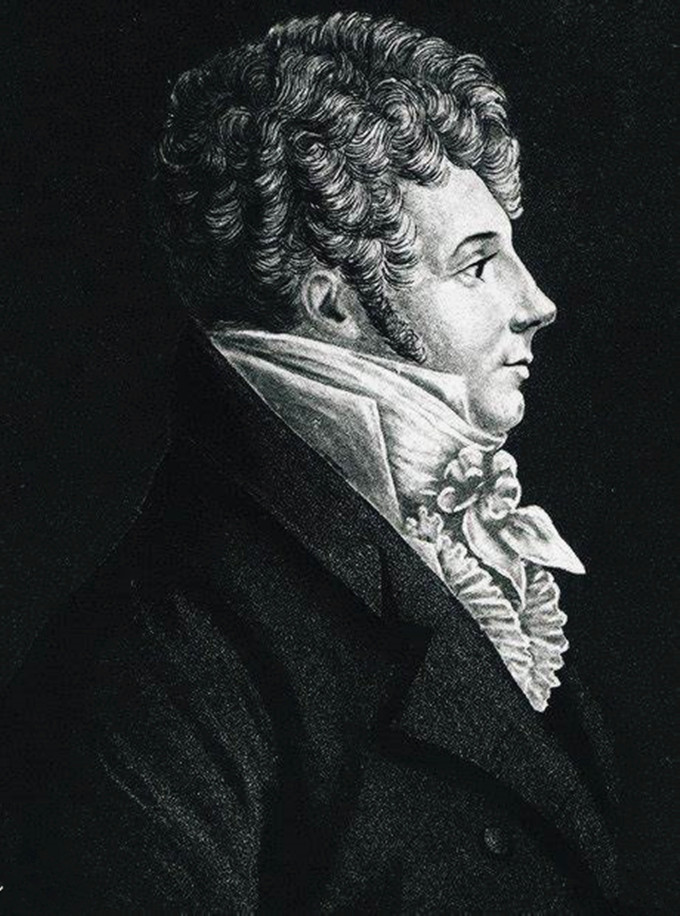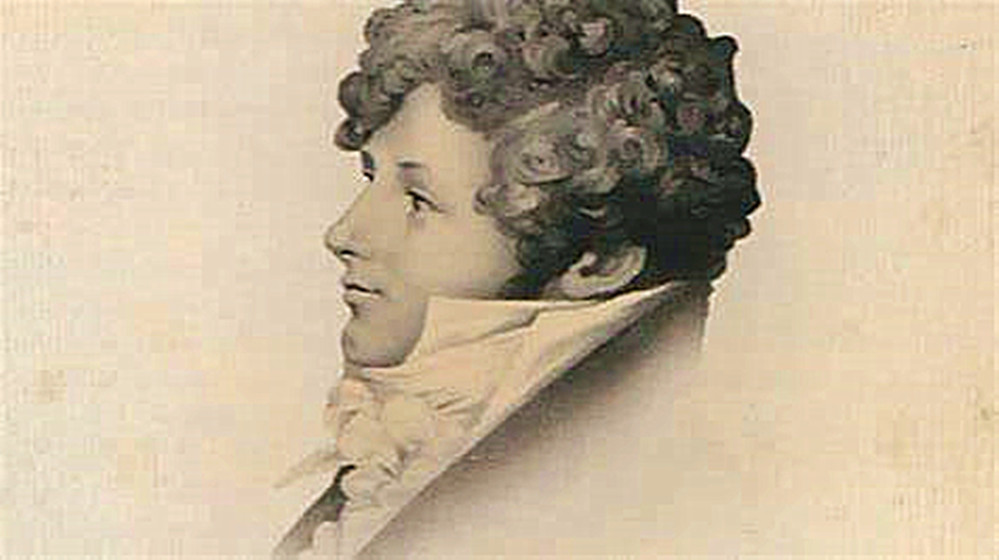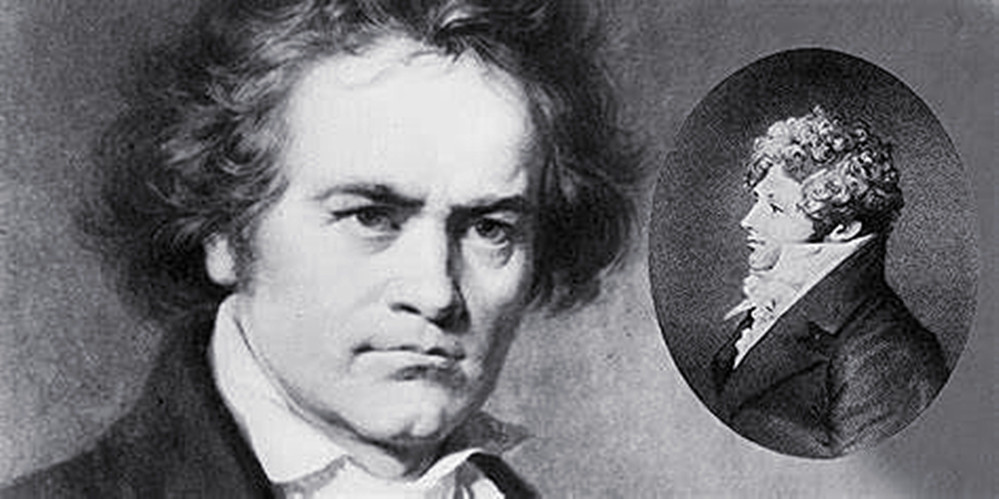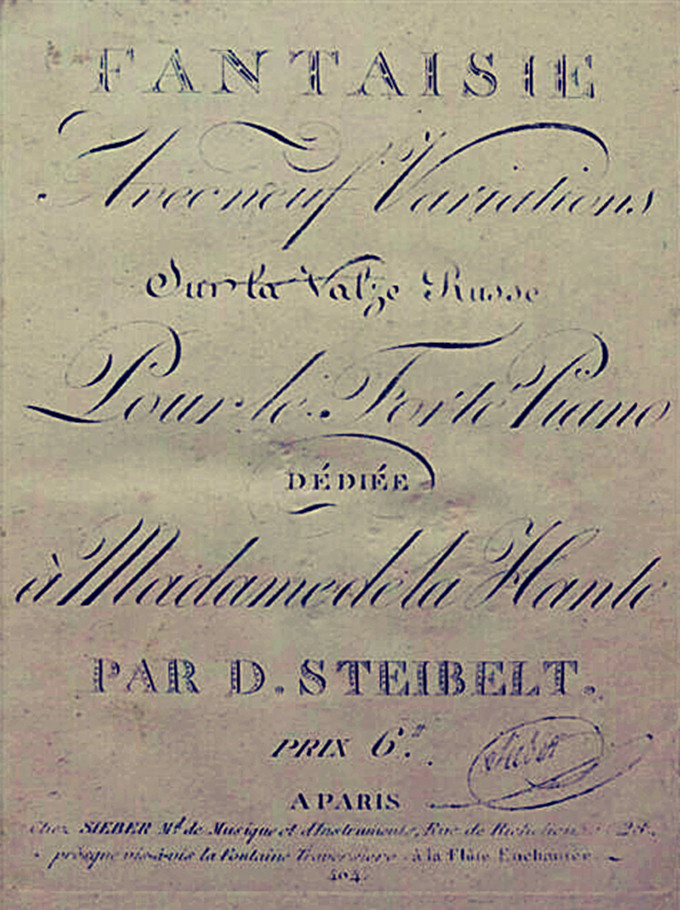| |
|
|
|
|
|
|
|
|
|
|
| |
| |
 |
|
| |
田润德 编译文/图
2020-09-20 20:36 |
|
| |
|
|
|
|
| |
 |
|
|
|
| |
丹尼尔·戈特利布·斯泰贝尔特(Daniel
Gottlieb Steibelt1765-1823) |
|
|
|
| |
|
|
| |
克莱格尔三重奏演奏丹尼尔·斯泰贝尔特—歌剧序曲《罗密欧与朱丽叶》
|
丹尼尔·斯泰贝尔特——歌剧序曲《罗密欧与朱丽叶》
斯泰贝尔特的第一部歌剧《罗密欧与朱丽叶》于1793年在巴黎上演。就像格奥尔格·本达(Georg
Benda)在1776年创作的同名《单声尖利》(Singspiel with the same name)一样,它也有一个美好的结局。
克莱格尔三重奏
山口庆子,小提琴
斯特凡尼亚维里塔,大提琴
安娜彼得罗瓦-福斯特,钢琴 |
|
Daniel Steibelt - 歌剧序曲《Romeo
and Juliet》 Steibelt's first opera "Romeo and Juliet" was represented in
1793 in Paris. Like Georg Benda's Singspiel with the same name (1776) it
has a happy end. Trio KLENGEL Keiko Yamaguchi, violin Stefania Verità,
cello Anna Petrova-Forster, piano |
|
|
|
|
| |
|
|
|
|
| |
音乐历史上的今天
1823年9月20日,“他是一个盗窃狂........他所挥霍掉的金钱数目加起来简直是犯罪.......他对自己音乐的不算多的尊敬,被他为了应付一时的困难而草就的那些毫无价值的音乐而破坏殆尽。而且,他还不时向更无用的功利之需低头。”——丹尼尔.斯泰贝尔特(Daniel
Steibelt,1764——1823)在圣彼得堡孤零零地去世,终年58岁。他是第一位把钢琴协奏曲的结尾加上合唱的人。
丹尼尔·戈特利布·斯泰贝尔特(Daniel Gottlieb
Steibelt)(1765年10月22日至1823年9月20日)是德国出生的钢琴家和作曲家,死于俄罗斯圣彼得堡。他的主要作品在巴黎和伦敦创作。
丹尼尔·斯泰贝尔特(Daniel Steibelt)出生于柏林,在被父亲强迫加入普鲁士军队之前,他曾与约翰·基恩伯格(Johann
Kirnberger)学习音乐。离开后,他开始了钢琴家的游牧生涯,然后于1790年在巴黎定居,在那里他通过为玛丽·安托瓦内特(Marie
Antoinette)创作的钢琴奏鸣曲《 La
Coquette》获得了广泛的演奏家的演奏。同样在巴黎,他的戏剧歌剧《罗密欧与朱丽叶》(Romeo et
Juliette)后来被赫克托·贝利奥兹高度推崇,并于1793年在剧院里制作。许多人认为这是他最原创,最成功的作品。
斯泰贝尔特开始在巴黎和伦敦之间分享他的时光,在那里他的钢琴演奏引起了极大的关注。1797年,他参加了J. P. Salamon的音乐会。
1798年,他制作了他的E协奏曲3号,其中包含以广泛的震颤为特征的风暴回旋曲,这非常流行。次年,斯泰贝尔特开始在德国进行专业巡回演出。在汉堡,柏林,德累斯顿和布拉格取得了一定的成功之后,他于1800年3月底抵达维也纳,据报道,他曾挑战贝多芬在冯·弗里斯伯爵家进行技能试验。费迪南德·里斯(Ferdinand
Ries)始终引用的叙述写于37年后;里斯没有参加,后来成为贝多芬的学生和朋友。里斯介绍了贝多芬如何通过即兴创作一个倒立放在音乐架上的新斯泰贝尔特作品的大提琴部分的主题来度过这一天。据报道,斯泰贝尔特冲出房间,再也没有涉足维也纳。里斯的叙述中有两个事实错误。
遭到这种公众羞辱之后,斯泰贝尔特本该退出巡回演出。
(不知道离开维也纳的日期,而贝多芬则于4月底或5月初离开维也纳:他于5月7日在匈牙利的布达演出。)斯泰贝尔特再次前往巴黎,在那里他组织了第一次约瑟夫·海顿(Joseph
Haydn)的演说家“创作”的表演,该表演于1800年12月24日在歌剧院举行。第一领事波拿巴在前往途中险些躲过炸弹袭击。
斯泰贝尔特刚刚发表了他最出色的奏鸣曲之一,他曾献给波拿巴的妻子约瑟芬。在英格兰第二次逗留(1802年3月至1805年3月)之后,斯泰贝尔特回到欧洲,在布鲁塞尔(1805年4月)举行音乐会,[7]并于夏季回到巴黎。他用名为拉费特·德·马尔斯(LaFêtede
Mars)的音乐插曲庆祝拿破仑在奥斯特里茨(Austerlitz)的胜利,拿破仑亲自出席了首演(1806年2月4日)。
1808年,他由沙皇亚历山大一世(Alexander
I)邀请到圣彼得堡,继弗朗索瓦·阿德里安·博伊迪厄(François-AdrienBoieldieu)于1811年担任法国歌剧总监。他一生都呆在那里。
1812年,他创作了《莫斯科大火》,这是献给俄罗斯民族的钢琴宏伟幻想。
他通常在1814年停止表演,但回到了他的第八号协奏曲的演奏平台,该协奏曲于1820年3月16日在圣彼得堡首演,并以合唱结局而著称。这比贝多芬非常规的第9号交响曲提前了四年,并且是有史以来唯一写过的钢琴协奏曲(不包括贝多芬的《合唱幻想曲》),直到亨利·赫兹的第六个协奏曲Op。
192(1858)和Ferruccio Busoni的钢琴协奏曲(1904)。
除了戏剧性的音乐,斯泰贝尔特还留下了许多作品,其中大部分是钢琴作品。据说他的演奏出色,尽管缺乏较高的品质,这些品质代表了像克莱默和穆齐奥·克莱门蒂这样的同时代人。尽管如此,他的演奏和作曲技巧仍使他能够在整个欧洲建立事业。格罗夫形容他“徒劳,自大,无礼,鲁莽奢侈,甚至不诚实。”如此严厉的道德判断是根据斯泰贝尔特一生中的某些事实为我们辩解的。如果要重建斯泰贝尔特人格的正确形象,必须谨慎对待对他的角色的这些和类似攻击。
斯泰贝尔特尽其所能,是一位富有想象力的作曲家,具有很强的个性。他的歌剧灰姑娘(1810)和罗密欧和朱丽叶(1793),他的所有钢琴协奏曲,室内乐,精选的许多奏鸣曲(例如,E-flat中的作品45和G中的作品64)和一些钢琴作品(随想曲和前奏,研究Op。78)具有足够的音乐价值,今天可以表演和欣赏。
今日视频:1、克莱格尔三重奏演奏丹尼尔·斯泰贝尔特—歌剧序曲《罗密欧与朱丽叶》;2、丹尼尔·斯泰贝尔特小提琴奏鸣曲Op.74,3号
(朱比利音乐会在俄罗斯国家图书馆圣彼得堡24.10.2015);【钢琴影视】贝多芬与施泰贝尔特的PK。 |
|
|
|
| |
|
|
|
|
| |
 |
|
| |
风华正茂的丹尼尔·斯泰贝尔特(Daniel
Steibelt),正是这个年代的他才有勇气和贝多芬较劲,1800年5月,斯泰贝尔特前往维也纳的唯一目的是摧毁贝多芬。 |
|
|
|
| |
丹尼尔·斯泰贝尔特(Daniel Steibelt)主要作品 |
|
|
|
| |
他的作品选录
1)舞台
罗密欧与朱丽叶(3)(1793)
阿尔伯特与阿德莱德(3798)
泽菲利的回归,一幕芭蕾(1802)
牧羊人的判断,三幕芭蕾(1804)
白卡斯蒂利亚女王(1805)
三月的节日,Intertermezzo(1806)
皇帝之妃芭蕾舞团(1809)
德布勒德里特(1810)
萨金斯,三幕戏,歌剧(1810年)(这很可能不是Steibelt的作品。)
灰姑娘,三幕歌剧(1810)
巴比伦公主宫,三幕歌剧(1812)
Le Jugement de Midas(1823?)
2)管弦乐队
C钢琴与管弦乐团第一协奏曲(1794年巴黎版)
E小调钢琴和管弦乐团第二协奏曲(1796年?)
E“ L'orage”中钢琴和管弦乐队的第三协奏曲(创建于1798年;巴黎编辑,1799年)
E♭钢琴和管弦乐队第四协奏曲(1800?)
E♭“狩猎” Op。中钢琴和管弦乐队的第五协奏曲。 64(创建于1802年;巴黎编辑1805年)
G小调“钢琴与管弦乐团第六协奏曲”,巴黎圣贝尔纳山”(巴黎,1817年版)
E小调《钢琴协奏曲》(第7协奏曲),有2个乐团,(巴黎1818年版)
E♭钢琴和乐团第八协奏曲“与隆多巴卡利亚,合唱合唱”(1820年),未出版。
竖琴协奏曲(1807)
交响乐团(1796)
进行曲和华尔兹
3)密室
回旋曲的最爱,适合小提琴或长笛以及吉他
3个弦乐四重奏,作品。 17(1796)
钢琴和弦乐三重奏,作品。 28(1797)
6弦乐四重奏,作品。 34(ca 1799)
3小提琴和吉他二重奏,作品。 37
3个弦乐四重奏,作品。 49(1800)
3小提琴奏鸣曲,作品。 69
1首钢琴和弦乐四重奏
钢琴和弦乐三十六重奏
竖琴和弦的6个三重奏
115双人钢琴和小提琴(?)
钢琴和竖琴(或两架钢琴)6首二重奏
6首竖琴奏鸣曲
钢琴,铃鼓和三角曲棍球的36个寻欢作乐者和12种多样化。
77首钢琴独奏奏鸣曲
45个回旋曲
32个幻想曲
21个特色
12个随想曲或前奏
20个锅
2个小夜曲系列
25系列变体
钢琴4手16奏鸣曲(其中至少6种是伪奏作品)
描述性片段(胜利,包围,前进曲棍球……)
华尔兹,丹西斯。
研究,作品。 78
4)Methode de Pianoforte(1805)
5)歌曲
6浪漫史(1798)
埃斯特尔航空(1798)
30首歌,作品。 10(1794)
笔记
前面的一个或多个句子包含现在来自公共领域的出版物的文字:奇索姆,休,艾德。 (1911)。 “斯坦贝尔,丹尼尔”。不列颠百科全书。
25(第11版)。剑桥大学出版社。 p。 870。
^赫克托·伯利兹(Hector Berlioz),《日记》杂志上的文章,1859年9月13日。
里斯(与韦格勒),传记作者,贝多芬的笔记Notizenüber Ludwig van(1838)。
^威廉·梅雷迪思(2012年夏)。 “ 韦斯特比-厄迪斯假说:“
Eroica”变体的历史和丹尼尔·斯泰贝尔特的钢琴五重奏,作品28,第2号”。贝多芬日记(26–44)。 2017年3月29日检索。
此页面的最后修改时间07.02.2019 05:32:02
本文使用来自免费百科全书钢琴的丹尼尔·斯泰贝尔特文章的材料,该材料已获得GNU自由文档许可。 |
|
|
|
| |
 |
|
| |
贝多芬(Beethoven) 丹尼尔·斯泰贝尔特(Daniel Steibelt) |
|
|
|
| |
|
这个人是贝多芬的“萨列里”吗? |
丹尼尔·斯滕贝尔特向伟大的作曲家贝多芬挑战决斗。
1984年的电影《阿马迪厄斯》使安东尼奥·萨利里几乎成为家喻户晓的词。
经过几个世纪的相对默默无闻,萨列里被电影观众称为嫉妒的知己和竞争对手沃尔夫冈·阿马德乌斯·莫扎特。
另一位音乐大师路德维希·范·贝多芬也有一位对手,尽管目前还不清楚是否有一位电影制作人热衷于在银幕上讲述他的故事。
丹尼尔·斯滕贝尔特的故事最近被曝光,这要归功于历史收藏网站上的一篇文章。
斯蒂贝尔特是“一个德国出生的古典钢琴家和作曲家,”他“显然也有一个巨大的自我,因为他挑战了一个,只有贝多芬在1800年在维也纳的音乐决斗,”林赛·斯蒂德姆写道。
和萨拉里一样,斯滕贝尔特在他的时代里取得了一点成功。 斯蒂德姆写道:“他为玛丽·安托瓦内特(Marie
Antoinette)创作的歌曲《卖弄风情的女人》(La
Coquette)很受欢迎。这位年轻的作曲家于1800年前往维也纳,在那里他首次提出了与他的德国作曲家贝多芬决斗的想法,贝多芬接受了挑战。
这个城市的音乐赞助人喜欢斯滕贝尔特和贝多芬决斗的想法。 每个音乐家都有一个王子来赞助这个想法。
比赛在奥地利贵族莫里茨·冯·弗里斯伯爵家里举行。
斯滕贝尔特带来了一首弦乐五重奏,它演奏了一首暴风雨般的乐曲,他用虚张声势在键盘上即兴演奏。
贝多芬,不会比得上,从弦乐五重奏中拿起乐谱,把它倒放在钢琴上,并在其中一个主题上自己即兴创作,他表现得过于简单化。
这显然是更有灵感的表演,聚会认可了。
在贝多芬还在演奏的时候,施泰贝尔特被羞辱了一下,冲出了房间,随后是他的亲王。
虽然近年来斯滕贝尔特一直是一个默默无闻的人物,但他的事业相当成功,甚至在1823年在圣彼得堡去世之前为拿破仑和俄罗斯沙皇亚历山大一世创作音乐。
但正是贝多芬的天才经受住了时间的考验。 |
|
|
|
|
| |
|
Was this man Beethoven’s ‘Salieri’? |
Daniel Steibelt challenged the great composer to a duel.
The 1984 film Amadeus made Antonio Salieri practically a
household word. After a couple of centuries of relative
obscurity, Salieri came to be known to moviegoers as the
jealous confidant and rival of Wolfgang Amadeus Mozart.
Another musical great, Ludwig van Beethoven, also had a
rival, though it’s unclear whether there is a filmmaker
out there who is keen on telling his story on the silver
screen.
The story of Daniel Steibelt came to light recently,
thanks to an article at the website
historycollection.co. Steibelt was “a German born
classical pianist and composer“ who “apparently also had
a huge ego because he challenged the one and only
Beethoven to a musical duel in Vienna in 1800,” writes
Lindsay Stidham.
Like Salieri, Steibelt achieved a modicum of success in
his day. “He rose to great popularity with ‘La
Coquette,’ a song he composed for Marie Antoinette,”
Stidham writes. The young composer made his way to
Vienna in 1800, where he first floated the idea of a
duel with his fellow German composer, Beethoven, who
accepted the challenge.
The city’s music patrons liked the idea of a duel
between Steibelt and Beethoven. Each musician got a
Prince to sponsor the idea.
The contest took place at the home of Austrian nobleman
Count Moritz von Fries. Steibelt brought along a string
quintet, which performed a stormy composition, and with
bravado, he improvised at the keyboard.
Beethoven, not to be outdone, picked up the sheet music
from the string quintet, placed it on the piano upside
down, and worked out his own improvisation on one of its
themes, which he showed up to be overly simplistic. It
was clearly the more inspired performance, and the
gathering recognized it. Humiliated, Steibelt stormed
out of the room while Beethoven was still playing,
followed by his prince-benefactor.
Though Steibelt has been an obscure figure in recent
years, he went on to have a fairly successful career,
even writing music for Napoleon and Russian Czar
Alexander I before his death in St. Petersburg in 1823.
But it’s the genius of Beethoven that has stood the test
of time. |
|
|
|
|
| |
 |
|
| |
丹尼尔·斯泰贝尔特(Daniel
Steibelt)的作品封面 |
|
|
|
| |
斯泰贝尔特和贝多芬的钢琴决斗 |
|
|
|
| |
在十九世纪上半叶,钢琴作为一种强大而富于表现力的音乐会乐器以及出色的客厅乐器而风靡一时。乐器结构的技术变化不仅使该乐器对家庭业余爱好者有吸引力,还催生了许多华丽的个性,这些个性遍布整个非洲大陆,以其演奏技巧来打动听众。而且,当然,每个人都声称自己是最好的。可以说,解决分数的最流行的方法是参加通常在贵族沙龙举行的音乐对决。我们都知道莫扎特与克莱门蒂之间,李斯特与塔尔伯格之间的冲突。因此,毫不奇怪的是,以丹尼尔·斯泰贝尔特(Daniel
Steibelt)(1765-1823)的名字鲁re地挥霍无度的演奏家,邀请了以著名钢琴演奏家抵达维也纳的路德维希·范·贝多芬(Ludwig
van Beethoven)接受了决斗的挑战。
1800年5月,斯泰贝尔特前往维也纳的唯一目的是摧毁贝多芬,他在相遇之前的几个月中已经公开宣布了这一点。决斗在冯·弗里斯伯爵宫举行,有约100人出席。一切都按照惯例展开,每个表演者首先要表演技术上具有挑战性的作品。贝多芬扮演莫扎特,斯泰贝尔特扮演海顿。第二轮涉及即兴表演,对手提供了一个主题,贝多芬轻而易举地赢得了比赛。最后一轮决定性的一轮比赛要求表演者应现场阅读对手所写的新作品。
Steibelt在B大调大调OP中演奏了贝多芬的新作《钢琴奏鸣曲》。
22岁,并赢得了应有的掌声。然后,史蒂布利特(Steiblet)稍稍改变了规则,交了贝多芬(Bethoven)不是钢琴曲,而是大提琴和钢琴的新奏鸣曲。贝多芬一心一意地拿下比分,将其上下颠倒,然后将视线向后看,并即兴创作了大约30分钟的主题。
Steibelt被彻底摧毁和羞辱,并在贝多芬完成之前走了出来。他拒绝再次与贝多芬见面,据作曲家费迪南德·里斯(Ferdinand
Ries)称,“这是一个条件,即在需要他自己的公司的情况下,不得邀请贝多芬。”
尽管受到贝多芬的侮辱,斯泰贝尔特作为钢琴家的力量一定是可观的,其丰富多彩的性格从未如此明显。
Steibelt生于柏林,最初与著名的音乐家,作曲家和理论家约翰·基尔恩伯格一起学习。他还加入了普鲁士军队,但随即逃离,不得不逃离该国。卧底运动并不断前进,他在维也纳和慕尼黑度过了一段时间,在那里他创作了《三个奏鸣曲》。其中1本发表于1788年。他在萨克森和汉诺威的部分地区举行了音乐会,并于1790年在巴黎永久定居。他根据莎士比亚的《罗密欧与朱丽叶》创作了一个随想曲,并成功制作。然而,他通过将旧作品伪装成新作品而迅速与出版商发生纠纷,并于1796年匆匆出发前往伦敦。在所罗门的音乐会系列中,他首先演奏了他著名的第三协奏曲,并为考文特花园创作了歌剧《恒定的受害者》。在伦敦期间,他还嫁给了一位年轻的英国女士,她是手鼓演奏的熟练者。
1799年,他因逃兵而被正式赦免,并在德累斯顿,布拉格和柏林举行了音乐会,然后与贝多芬进行了对决。回到巴黎后,他出版了钢琴大奏鸣曲,并一直热衷于讨好自己,献给波拿巴夫人。另一个厚脸皮的出版业-用海顿的个人音乐改编装饰海顿的“创作”-造成了严重的冒犯,他于1802年再次匆忙前往伦敦。在接下来的6年中,史泰伯忙于在伦敦和巴黎之间旅行,创作了大部分钢琴作品。
1808年,斯泰贝尔特(Steibelt)被任命为圣彼得堡法国歌剧院的导演,并在他的余生中继续管理和创作这家机构。在圣彼得堡,他还遇到了约翰·菲尔德,后者成为了忠实的朋友。拿破仑于1812年进入莫斯科时,施泰贝尔特迅速创作了一部精美的钢琴奇幻作品《摩辛库》,到1820年,他完成了一些最后的演出。他于1823年9月20日去世,并为斯泰贝尔特的家人组织了一场福利音乐会,尽管他的收入惊人,但仍处于相对贫困的状态。他的主要歌剧作品的全部曲目都未能幸存,这可能是因为评论家称他的音乐“倾斜,但费力而丑陋”。除了较大的奏鸣曲和幻想曲外,他的许多演奏家钢琴作品也遭受了同样的命运。他的钢琴和弦乐三重奏表现更为出色,并显示出Steibelt是富有创造力的富有想象力的作曲家。他们当然应该今天进行表演。
|
|
|
|
| |
 |
|
|
|
| |
丹尼尔·斯泰贝尔特(Daniel
Steibelt)的小提琴奏鸣曲第一页 |
|
|
|
| |
During the first
half of the nineteenth century, the piano became all the rage as a
powerful and expressive concert instrument as well as the parlor
instrument par excellence. Technical changes in the construction of the
instrument not only made the instrument attractive to amateurs at home,
it also spawned a number of flamboyant personalities that crisscrossed
the continent seeking to impress audiences with their virtuoso
performance skills. And, of course, everybody claimed to be the best.
The most popular way of settling the score — so to speak — was to engage
in musical duels, generally held in the salons of nobility. We all know
about the clashes between Mozart and Clementi, and between Liszt and
Thalberg. So it was hardly surprising that a recklessly extravagant and
extraordinarily vain virtuoso by the name of Daniel Steibelt (1765-1823)
goaded Ludwig van Beethoven — who had arrived in Vienna as a celebrated
piano virtuoso — into accepting a duel challenge.
In May of 1800, Steibelt traveled to Vienna for the sole purpose of
destroying Beethoven, something he had already publicly announced in the
months leading up to the encounter. The duel was held in the Palais of
Count von Fries, with about 100 people present. It all unfolded
according to convention, with each performer first performing a
technically challenging composition. Beethoven played Mozart, and
Steibelt played Haydn. The second round involved improvisation on a
theme supplied by the rival, which Beethoven handily won. The final and
decisive round demanded that performers should sight-read a new piece
written by their opponent. Steibelt played Beethoven’s newly composed
Piano Sonata in B-flat major, op. 22, and earned some deserved applause.
Then Steiblet bend the rules somewhat by handing Beethoven not a piano
composition, but a new sonata for cello and piano. Beethoven
nonchalantly took the score and turned it upside-down, then sight-read
it backwards and improvised on one of its themes for about 30 minutes.
Steibelt was completely destroyed and humiliated, and walked out before
Beethoven had finished. He refused to ever meet Beethoven again, and
according to the composer Ferdinand Ries, “made it a condition that
Beethoven was not to be invited where his own company was desired.”
Despite being humiliated by Beethoven, Steibelt’s powers as a pianist
must have been considerable, and his colourful character never more
evident. Born in Berlin, Steibelt initially studied with the renowned
musician, composer and theorist Johann Kirnberger. He also joined the
Prussian army, but deserted and had to flee the country. Staying
undercover and constantly on the move, he spent some time in Vienna and
Munich, where his Three Sonatas Op. 1 were published in 1788. He gave
concerts in parts of Saxony and Hanover and permanently settled in Paris
in 1790. He set a libretto based on Shakespeare’s “Romeo and Juliet”,
which was successfully produced. Yet he quickly got into trouble with
his publisher by disguising old works as new, and hastily departed for
London in 1796. At Salomon’s concert series he first played his
celebrated Third Concerto, and composed the opera “The Victim of
Constancy” for Covent Garden. While in London he also got married to a
young Englishwoman, who was a skilled performer on the tambourine. In
1799, he was officially pardoned for his desertion from the army, and
gave concerts in Dresden, Prague and Berlin before getting the shorter
end of the stick in his duel with Beethoven. Once he returned to Paris,
he published a “Grand Sonata” for piano, and always eager to ingratiate
himself, dedicated it to Madame Bonaparte. Another cheeky publishing
venture — adorning Haydn’s “Creation” with his personal musical
alterations — caused considerable offense, and once again he hastily
left for London in 1802. For the next 6 years, Steibelt busily traveled
between London and Paris, composing much of his piano oeuvre. In 1808,
Steibelt was appointed director of the French Opera in St. Petersburg
and continued to manage and compose for this institution for the rest of
his life. In St. Petersburg he also met John Field, who became a loyal
friend. When Napoleon entered Moscow in 1812, Steibelt quickly composed
an elaborate piano fantasy, “L’incendie de Moscou”, and by 1820 he gave
some of his final performances. He died on 20 September 1823, and a
benefit concert was organized for Steibelt’s family who, despite his
fabulous earnings, had been left in comparative poverty. Full scores of
his major operatic works have not survived, probably because critics
pronounced his music “leaned, but laboured and ugly”. The same fate has
befallen many of his virtuoso piano pieces, with the exception of the
larger Sonatas and Fantasies. His three quintets for piano and strings
have fared better, and show Steibelt as an imaginative composer of
strong individuality. They certainly would deserve to be performed
today. |
|
|
|
| |
 |
|
| |
|
丹尼尔·斯泰贝尔特(Daniel
Steibelt)的钢琴作品唱片封面 |
|
Die titelseite eines piano
-arges Von Daniel steibel |
|
|
|
|
| |
 |
|
| |
|
丹尼尔·斯泰贝尔特(Daniel
Steibelt)钢琴作品唱片封面 |
| Die
titelseite eines piano -arges Von Daniel steibel |
|
|
|
|
|
|
|
| |
|
|
丹尼尔·斯泰贝尔特(1765 -
1823)小提琴奏鸣曲Op.74,3号
演出:朱比利音乐会在俄罗斯国家图书馆圣彼得堡(24.10.2015)
曲目:
作品74第三奏鸣曲
第一乐章——快板
第二乐章——Adag
第三乐章,回旋曲。转眼间
演出:安娜·切布科娃,小提琴,安娜·彼得罗夫斯特,钢琴 |
Daniel Steibelt (1765-1823)
小提琴奏鸣曲Op.74, No.3
演出:Jubilee Concert in the National Library of Russia St.
Petersburg(24.10.2015)
曲目:
Sonata op. 74, No. 3
1st Movement – Allegro
2nd Movement – Adag
3rd Movement – Rondo. Presto
演出:Anna Chebukova, violin;Anna Petrova-Forster, piano |
|
|
|
|
| |
Today in the
history of music
On September 20, 1823, Daniel.Stebert died "He was a
kleptomaniacal...The amount of money he squandered added up to a
crime...The little respect he had for his music was destroyed by the
worthless music he had scribbled in order to cope with a momentary
difficulty.And, from time to time, he also more useless kilometers need
to bow."-- Daniel Steibelt (1764 -- 1823) died alone in St. Petersburg,
aged 58.His piano concerto no. 1 ends in a chorus.
Daniel Gottlieb Steibelt (October 22, 1765, solstice, September 20,
1823) was a german-born pianist and composer who died in st. Petersburg,
Russia.His major works were written in Paris and London.
Daniel Steibelt was born in Berlin and studied music with Johann
Kirnberger before being forced by his father to join the Prussian
army.After leaving, he embarked on a nomadic career as a pianist and
settled in Paris in 1790, where he gained a wide range of performances
with the piano sonata "La Coquette" by Marie Antoinette.Also in Paris,
his dramatic opera, Romeo et Juliette, was later highly regarded by
Hector bellioz and produced at the TheatreFeydeau in 1793.Many consider
it his most original and successful work.
Stebert began to share his time between Paris and London, where his
piano playing attracted a great deal of attention.In 1797, he attended a
concert by J. P. Salamon.In 1798, he produced his E Concerto No. 3,
which contained the wildly popular Rondo of the storm, characterized by
widespread tremors.The following year, Steibert began a professional
tour of Germany.After some success in Hamburg, Berlin, Dresden and
Prague, he arrived in Vienna at the end of March 1800 and reportedly
challenged Beethoven to experiment with his skills at count von Frith's
house.The narrative Ferdinand Ries continues to cite was written 37
years later;Rhys did not attend and later became a student and friend of
Beethoven.Riess describes how Beethoven spent the day by improvising a
theme for the cello section of the new Steibert piece, which stood
upside down on a musical stand.Stebert reportedly rushed out of the room
and never set foot in Vienna again.There are two factual errors in
Rhys's account.
After this public humiliation, Steibert should have withdrawn from the
tour.(The date of departure from Vienna is not known, and Beethoven left
Vienna at the end of April or early May: he performed in Buda, Hungary,
on May 7.)Stebert again traveled to Paris, where he organized the first
performance of Joseph Haydn's orator, "Creation," which took place at
the Opera on December 24, 1800.First Consul Bonaparte narrowly avoided a
bomb on his way.Stebert has just published one of his best sonatas,
which he dedicated to Bonaparte's wife Josephine.After a second sojourn
in England (March 1802 to March 1805), Steibert returned to Europe,
giving concerts in Brussels (April 1805), [7] and returning to Paris in
the summer.He celebrated Napoleon's victory at Austerlitz with a musical
episode called La LaFetede Mars, which Napoleon himself attended (4
February 1806).
In 1808, he was invited to St. Petersburg by Tsar Alexander I and
succeeded Francois-Adrien Boieldieu as French opera director in 1811.He
stayed there all his life.In 1812, he wrote The Great Fire of Moscow, a
grand piano fantasy dedicated to the Russian nation.
He usually stopped performing in 1814, but returned to the platform for
his Concerto No. 8, which premiered in St. Petersburg on March 16, 1820
and is known for its choral finale.This was four years earlier than
Beethoven's unconventional Symphony No. 9, and was the only piano
concerto ever written (not including Beethoven's Choral Fantasia) until
Henry Hertz's sixth Concerto, Op.Piano Concertos by 192 (1858) and
Ferruccio Busoni (1904).
In addition to his dramatic music, Steibert left behind many works, most
of which were piano pieces.He is said to have played well, though
lacking the higher qualities that typify contemporaries such as Kramer
and Muzio Clementi.Nevertheless, his playing and composing skills
enabled him to build a career throughout Europe.Grove described him as
"vain, arrogant, impertinent, reckless, even dishonest."Such harsh moral
judgments are justified on the basis of certain facts in Stebert's
life.These and similar attacks on Stebert's character must be treated
with caution if the right image of his character is to be restored.
Stebert was, to the best of his ability, an imaginative composer with a
strong personality.His operas Cinderella (1810) and Romeo and Juliet
(1793), all his piano concertos, chamber music, a selection of many
sonatas (for example, Opus 45 in E-Flat and Opus 64 in G) and some piano
works (Cappella and prelude, study Op.Have enough musical value to be
performed and enjoyed today.
Video of the day: 1. Craig Trio performs Daniel Stebert's opera Overture
romeo and Juliet;2. Daniel stebert violin sonata op. 74,3 (jubilee
concert in st. Petersburg, Russian state library 24.10.2015);Beethoven
and Stebert's PK. |
|
| |
|
|
|
|
| |
|
|
| |
【钢琴影视】贝多芬与施泰贝尔特的PK
|
贝多芬与斯泰贝尔特
对斯泰贝尔特来说,这是一场灾难;据报道,贝多芬用了很长一段时间即兴创作了一个主题,这个主题取材于一首新的钢带乐曲的大提琴部分,这首曲子被倒挂在乐谱架上。 |
|
|
|
|
| |
|
|
|
|
| |
|
|
|
|
| |
未得原作者编者授权严禁转载www.mt77.com任何内容 |
|
|
|
|
|
|
|
|
|
|
|
|
|
|


